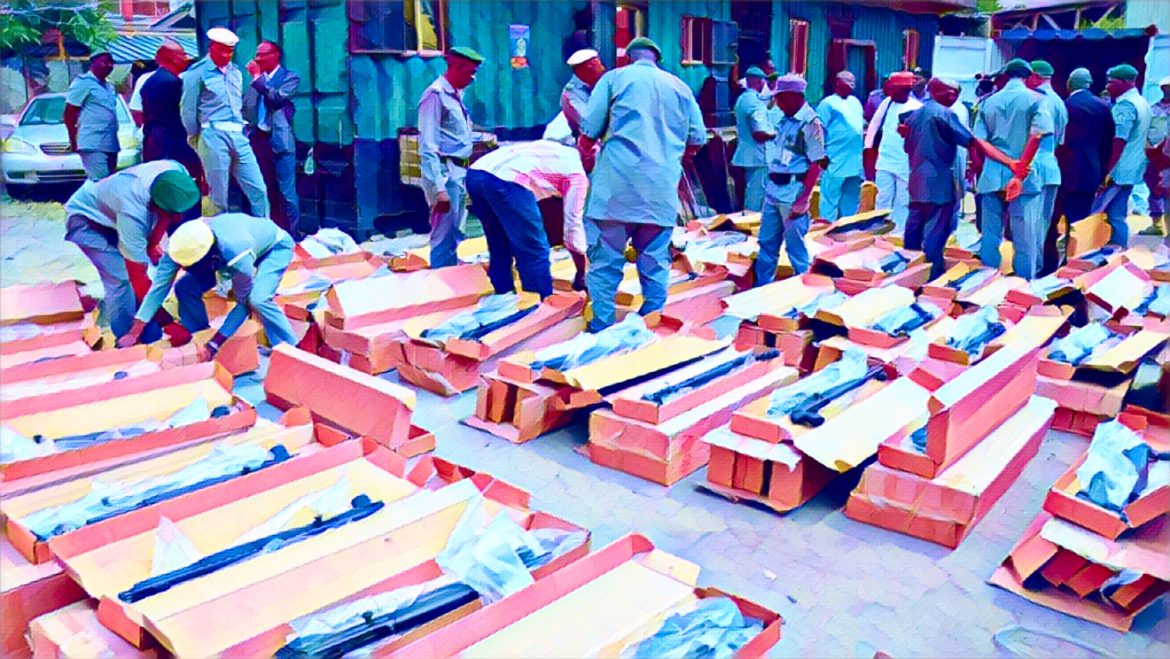KEY POINTS
- Illegal arms recovered in Nigeria within the year 2010 to 2017 disclosed to be 21,669,874 that were seized.
- Failure to integrate becomes a cause for concern as to the disposal of seized firearms.
- Security experts question how seized arms are being disposed and they call for accountability and transparency.
Citizens of Nigeria are becoming informed and asking for where much of the stock of arms and ammunition seized at the ports and at borders over the years have been. Some of these arms were seized by the Nigerian Customs Service (NCS) while others were recovered from criminals; the whereabouts of these weapons unknown.
Seizures of arms and outstanding issues
According to data on seizures between 2010 and 2017, 21.5 million arms and ammunition were intercepted in Nigeria out of which 21.4 million were live rounds of ammunition intercepted at the Apapa Port the same year. In recent past, similar consignments have been impounded such as the Turkey origin seize bearing arms worth over four billion Naira and unknown to the public is what happens next. While the seizure was highly publicized, little information has emerged about subsequent actions, and critics fear that these dangerous items can be returned to circulation.
The police have been left out from these investigations stating that they act as the main organ of enforcement of the law. Security sources revealed that there has been no effective cooperation between the NCS and the police and other investigative agencies. Consequently, the chance of seized weapons being handled or stored wrongly or even kidnapped is very high.
Where do the weapons go?
The Nigerian Customs Service wants the public to know that it always transfers all seized items to the rightful agencies. However, security experts argue that because there is no set method of accounting for these arms from the point that they are captured to the point that they are disposed there will always be space for these arms to be channeled back into the black market.
Dr. Brasca Ifeadi was a Deputy Comptroller General with the Nigeria Immigration Service, and in his opinion, seized arms should be entrusted to the police or military for functional use. Due to this, the informality of these procedures has bred suspicion that some of these seized firearms end up back in circulation, having been sold off by unscrupulous officials or lost due to record keeping and coordination problems.
The National Centre for the Control of Small Arms and Light Weapons (NCCSALW) has said that, according to international law and professional practice, reclaimed firearms cannot be used again by the security forces despite the sound working conditions. For this reason, these weapons have to be disposed by either storing them properly to discourage re-usage or eliminated from common use completely.
The need for accountability
According to Vanguard, All sources analysed state that communication between agencies is the main area that will determine whether or not weapons seized will return to circulation. Considering the police force as the leading internal security agency, they should be more involved in the handling and or investigating on the seized arms. Ex-Director of the Presidency, Jude Mekwunye noted that, there is need to practice or exercise accountable transparency and document appropriately.
And this is especially important for Nigeria to fights terrorism, banditry, and other forms of violent crime, as there should be no chances for the walked-in weapons to be again used by criminals. The recent confusion over how officers handle seized firearms threatens both national security and the credibility of the police agencies.


